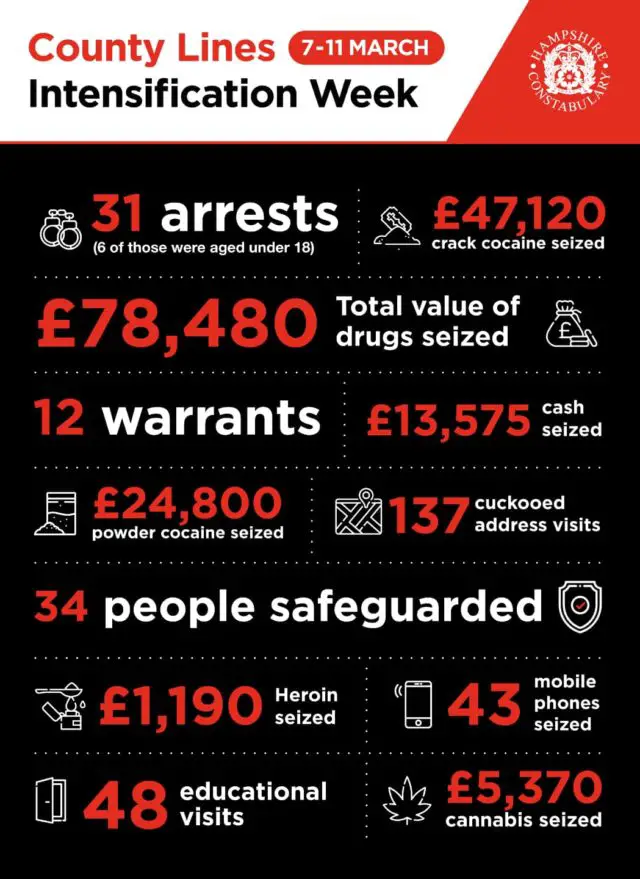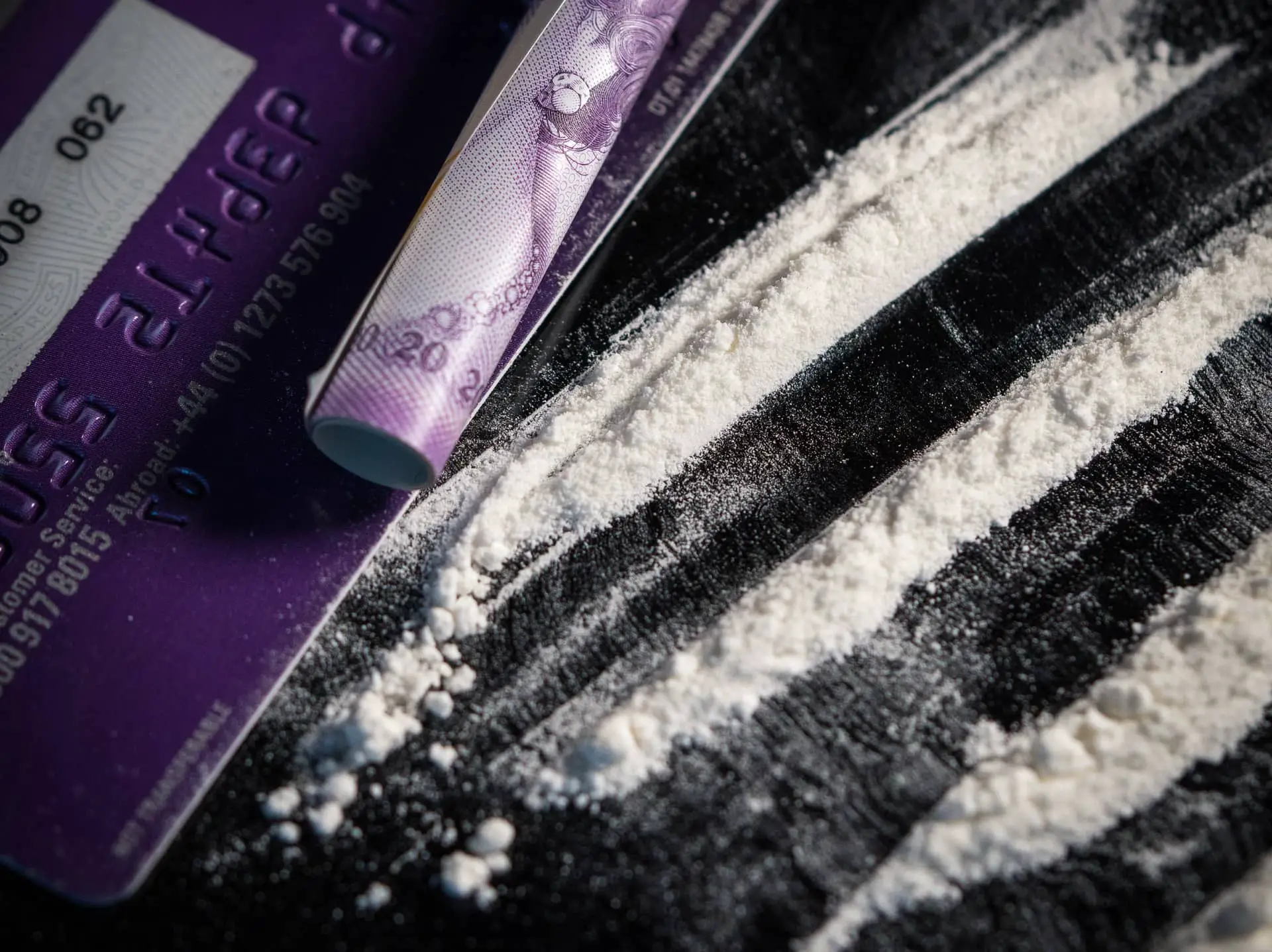News OnTheWight has requested a breakdown of Isle of Wight specific figures and will update once we hear back. Ed
National county lines intensification week, which targets drug traffickers who often recruit children and vulnerable adults to supply drugs across the country, ran from Monday 7th to Sunday 13th March.
Hampshire Constabulary joined all other police forces in England and Wales engaged in operations to crackdown on county lines.
As a result of this national activity:
- 1,444 people were arrested
- £1.4 million in cash seized
- Approximately £1.75 million worth of Class A drugs seized and £2.5 million worth of Class B drugs seized
- 305 weapons seized, including 43 firearms and 213 bladed weapons
- 104 drug lines were identified and seized
- 36kg of heroin was seized from addresses
- 799 cuckooed addresses visited
- 671 were identified and actively safeguarded by police and partners
- 7,919 people were engaged with for safeguarding purposes, this includes education, awareness and signs to look out for.
Highlights from Hampshire Constabulary’s contributing activity were:
- 12 warrants executed
- 31 arrested – 30 men (six were aged under 18) and one female
- 43 mobile phones seized
- £13,575 cash seized
- £78,480 of drugs seized
- £47,120 crack cocaine seized
- £1,190 heroin seized
- £24,800 powder cocaine seized
- 48 education visits carried out including 10 taxi firms
- 134 cuckooed addresses visited
- 5 landlord visits
- 34 vulnerable individuals safeguarded, including four children.
Portsmouth
In Portsmouth, officers investigating Class A drugs supply in the Portsmouth and Havant areas conducted a number of warrants based on intelligence received about addresses in Portsmouth. As a result, Ewyn Sain Denecker, 33, of Osborne Road in Southsea and Mario Barcela Candeia Sala, 32, of Prince Albert Road in Southsea have been charged with conspiracy to supply crack cocaine and heroin. Both men have been remanded into custody and will appear before Portsmouth Crown Court on Monday 11th April.
Southampton
Officers from Southampton’s High Harm Team executed a warrant at an address in Woolston and seized suspected Class A drugs worth tens of thousands of pounds. Mohammed Ali Artan, 36, from Centenary Plaza, was charged with possession with intent to supply a controlled Class A drug – cocaine and remanded to appear at Southampton Magistrates’ Court and was further remanded to appear at Southampton Crown Court on 15th April.
A prosecution on a county lines drug network trial came through during the week of intensification for a London network operating in Hampshire. The pair were sentenced to a total of ten years.
Offenders arrested and ‘active lines’ shut down
More than 10,000 people have now been arrested for being involved in County Lines since November 2019 when new tactics were established to target the supply of drugs through this method.
In November 2019, a number of pilot operations funded by the Home Office were launched focusing on the three areas of Merseyside, West Midlands and the Metropolitan Police Service, where the most lines originate. This was set up alongside a taskforce targeting the transport network, led by the British Transport Police.
As a result of the work that has been carried out by these major exporting force areas, combined with the work of the British Transport Police and the ‘importing forces’, a total of 2,500 lines have now been closed down.
Safeguarding victims
A vital reason to tackle county lines is the safeguarding of young children and vulnerable adults, often groomed to run drugs from one city to other parts of the country. Grooming is often followed by extreme violence and coercive behaviour.
During the past week, 671 were actively safeguarded nationally; 34 of these vulnerable individuals including four children, were identified and safeguarded by Hampshire Constabulary and our partners. This number is likely to rise in the coming days as further interventions take place and collaboration with partners continues.
In Hampshire, in the last five months alone, 39 children have been identified as being concerned in county lines activity both in and outside our Force area.
Police work with relevant services, agencies and charities to help safeguard children and vulnerable adults, and use a variety of options available to them, including Rescue and Response referrals, strategy meetings, safety plans created and Modern Slavery Crime reports.
Police can also bring victimless prosecutions for modern slavery offences, just one of the many ways officers are protecting young people. Victimless prosecutions ensure children and vulnerable adults are spared the ordeal of having to go through the court process to give evidence and face the violent and abusive individual responsible for their suffering.
This county lines intensification week was once again run in partnership with The Children’s Society and their #LookCloser campaign to spot the signs of exploitation in children and young people.
Additional funding
In December 2021, the Home Office launched their 10-year drug strategy ‘From harm to hope’, which is aimed at cutting crime and saving lives by reducing the supply and demand for drugs and delivering a high-quality treatment and recovery system.
As part of this strategy, policing was granted an additional three years of funding to continue bringing perpetrators to justice, safeguarding and supporting victims, and reducing violence and homicide.
During this week of action, from the suspected deal phones seized, police sent 1,047 health diversion messages to assumed drug users in Southampton offering them support and access into local drug rehabilitation services.

McNulty: Doing everything possible to rescue those being exploited
National Police Chiefs’ Council lead for County Lines, Graham McNulty, said,
“We are continuing to be successful in taking down violent county lines and arresting the criminals operating them, whilst also doing everything possible to rescue those being exploited. The figures from our latest intensification week are testament to this and highlight to the public our absolute determination to rid communities of this abhorrent crime.
“We welcome the additional three years funding from the government following the recent launch of their ten-year drug strategy, which will help us carry on our relentless pursuit of those behind the lines.
“However, our work is not only about going after criminals and shutting down active lines. There is also the prevention and safeguarding elements, which are equally as important, and in addition to the arrests and drugs we seize, I’m heartened that 671 vulnerable adults and children have been safeguarded and will now be looking at a brighter future away from crime and violence.
“As we look ahead, noting the recent end to Covid-19 restrictions, criminals may think this type of offending will become easier, but I want to send a message to them, as well as reassure the public: policing will not stop in its relentless fight against violent county lines criminals.”
Malthouse: One of the most destructive forms of criminality
Crime and Policing Minister, Kit Malthouse said,
“County lines drug dealing is one of the most destructive forms of criminality in the UK and crushing this monstrous supply model is a government priority.
“We are bolstering our efforts. Initiatives like our County Lines Programme are dismantling gangs in the regions most blighted by this crime, but every single successful police operation makes our streets safer.
“This intensive week of action has once again been a huge success and I thank the dedicated officers across England and Wales for their relentless pursuit of these criminal organisations, and their commitment to saving the victims so ruthlessly exploited by them.”
Dhanda: Disrupting and dismantling these networks
Hampshire Constabulary’s tactical lead for County Lines and Drug Related Harm, Chief Inspector Ricky Dhanda, said,
“Our involvement with this national week of action enables us to work cross borders with other forces and our South East Regional Organised Crime Unit (SEROCU) to ensure we are continually making our towns and cities a hostile environment for drug dealing, by disrupting and dismantling these networks.
“We’ve had a successful week of intensification with a significant amount of drugs taken off our streets and those involved arrested and charged. It’s important to add that a lot of educational work is done by police and partners continually throughout the year. The week provides a focus on the high harm these drug gangs pose to our communities and to young and vulnerable people in our society who they often exploit and bring misery too.
“Officers across Hampshire and the Isle of Wight are fully committed to ensuring that local communities do not suffer as a result of drug-related harm or County Lines drug dealing activity. We are actively working to disrupt County Lines drug dealing constantly and our aim is to prevent the exploitation of vulnerable people, while making sure that Hampshire remains a safe place to work and live.”
Simmonds-Read: #LookCloser campaign encourages everyone report concerns
James Simmonds-Read, from The Children’s Society’s Prevention programme, which is this week continuing to work with forces as part of its #LookCloser Awareness Fortnight, said,
“We welcome the arrests of criminals who cynically exploit children, but just as important is the vital work police do to ensure these young people are identified and offered crucial help.
“Spotting the signs of exploitation isn’t just a matter for professionals, however, and our #LookCloser campaign encourages everyone from transport and bank staff to commuters, shoppers and people using online platforms or games to report concerns.
“Doing so can be a vital first step in helping children escape terrifying exploitation, which they often do not report themselves because they are too scared to seek help or have been manipulated into thinking they are making a choice.”
Get in touch
People should report any concerns to the police on 101. In an emergency call 999.
If on a train text British Transport Police on 61016. Dial 999 if there is an immediate risk to a child. Alternatively contact Crimestoppers anonymously online or call their helpline on 0800 555111.
If concerns arise online people should also contact the relevant digital platform.
News shared by Hampshire and Isle of Wight Constabulary, in their own words. Ed
Image: colin davis under CC BY 2.0





